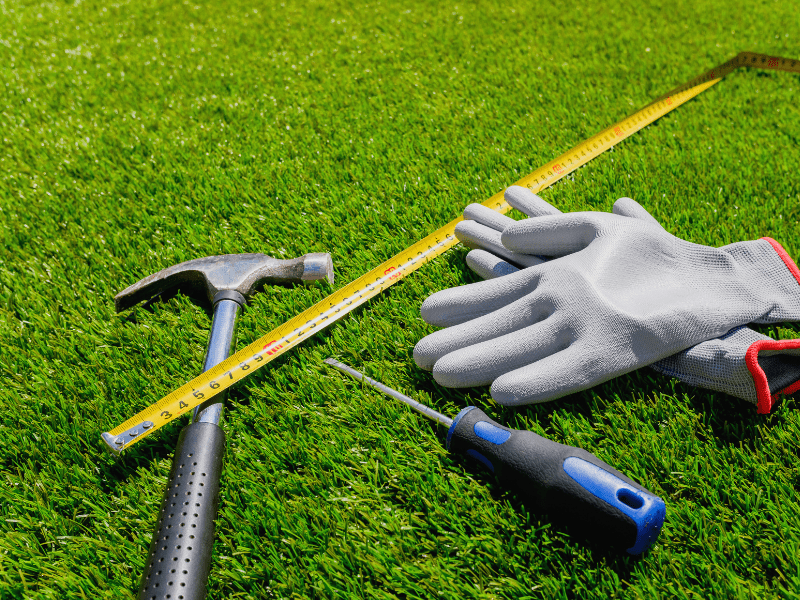Turf Maintenance for Homeowners
Artificial turf offers the beauty of a green lawn without the burden of mowing, watering, or fertilizing. Still, homeowners should follow basic upkeep practices to keep turf in top condition.
Routine Home Turf Care Tips
- Debris Removal: Use a leaf blower or plastic rake to remove leaves, twigs, and pet hair. Prevent organic matter buildup that can trap moisture or cause odor
- Rinse Occasionally: Spray with a garden hose to wash away dust, pollen, and spills—especially after dry spells or heavy use.
- Brush the Fibers: In high-traffic areas, turf blades may flatten. Use a stiff broom to brush against the grain and restore a natural look.
Pet-Friendly Turf Maintenance
- Solid Waste: Scoop and dispose as usual. Hose off any residue.
- Urine Odor Control: Use turf-safe deodorizers or a vinegar-water mix to neutralize smells.
- Regular Rinsing: Especially in areas pets frequent to prevent bacteria buildup.
Seasonal Turf Tips for Homeowners
- Spring/Summer: Rinse more frequently due to dust and allergens.
- Fall: Remove leaves regularly to prevent moisture traps.
- Winter: Let snow melt naturally when possible. Avoid metal shovels or salt, which may damage turf.
Turf Maintenance for Commercial Properties
Commercial turf systems are exposed to heavier foot traffic, weather extremes, and public use. Keeping these surfaces clean, safe, and appealing requires consistent care and occasional professional service.
High-Traffic Turf Needs
- Frequent Cleaning: Use blowers or commercial turf sweepers to clear debris daily or weekly depending on traffic.
- Power Rinsing: Rinse large areas regularly to remove dirt, spills, and airborne pollutants.
- Scheduled Brushing: Keep blades upright and infill level, especially in entrances, walkways, and recreation areas.
Infill Maintenance
- Redistribution: Brush or rake turf regularly to keep infill evenly spread.
- Replenishment: Add infill as needed to maintain cushion and blade support in high-use zones.
Spill & Stain Response
- Fast Action: Clean spills immediately with water and mild soap.
- Oil-Based Substances: Use turf-safe solvents (like mineral spirits) for sunscreen, food grease, etc.
- No Harsh Chemicals: Avoid bleach or alcohol-based cleaners that can degrade turf fibers.
Drainage & Inspection
- Standing Water: Regularly check drainage performance. Poor runoff can cause pooling, mold, or fiber separation.
- Seam Integrity: Inspect seams and edges to prevent weed growth and trip hazards. Reseal as needed.
Seasonal Considerations for Facilities
- Spring/Fall: Increase cleaning during pollen and leaf-drop seasons.
- Winter: Use plastic shovels or blowers for snow. Avoid salt-based ice melt products.
Why Professional Maintenance Helps
- Deep Cleaning: Commercial turf benefits from periodic sanitization and infill top-offs.
- Repairs: Fix loose seams, high-wear zones, or pet damage with expert help.
- Long-Term ROI: Scheduled professional care can add years to your turf system’s life.
Partner with Carolina Turf Systems for Expert Turf Care
Whether you’re maintaining a backyard oasis or managing a large-scale commercial space, Carolina Turf Systems has the tools, expertise, and service plans to help. From basic upkeep tips to advanced restoration services, we’re here to protect your investment and keep your turf looking vibrant all year long.
Contact us today to schedule a residential or commercial turf maintenance consultation.

